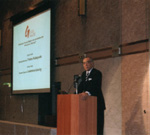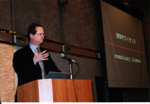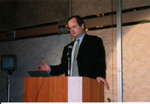GLOCOM Forum 2003: Keynote Speech Summary
Takahiro MIYAO (Professor, GLOCOM, and Head, Japanese Institute of Global Communications)
| GLOCOM Forum 2003 | |
| Date/Time: | December 2 (T), 10:20 – 17:00 |
| Place: | Arcadia Ichigaya, 4-2-25 Kudankita, Chiyoda-ku, Tokyo, Japan |
| Program: |
Main Theme:
Intellectual Property Rights in the Information Age: Protection or Sharing?
Opening Remarks:
Yotaro Kobayashi (Chairman of the Board at Fuji Xerox Co., Ltd., and Chairman of the International University of japan)
Keynote Speech: 
"Free Culture"
Lawrence Lessig (Professor, Stanford Law School and Chairman of Creative Commons)
Video:
Panel 1: e-Japan and Future of Open Source
Panelists:
Jiro Makino (Lawyer, Makino Law Office)
Hiroshi Koyama (Assistant Professor, GLOCOM)
Hideyo Shimamura (Information Policy Section, Nagasaki Prefecture Government)
Masanori Kusunoki (National Technology Strategist, Microsoft Asia)
Nobuo Ikeda (Senior Fellow, RIETI)
Moderator:
Keizuke Kamimura (Assistant Professor, GLOCOM)
Panel 2: Creative Commons and Benefits for Creators
Panelists:
Akira Yoshikawa (Director of the Copyright Division, Agency for Cultural Affairs)
Mamoru Katoh (Managing Director, Japanese Society for Rights of Authors, Composers and Publishers)
Koichi Hayashi (Professor, Keio University)
Emi Wakatsuki (Lawyer, Makino Law Office)
Lawrence Lessig (Professor, Stanford Law School, and Chairman of Creative Commons)
Moderator:
Hajime Yamada (Professor, Toyo University, and Deputy Executive Director, GLOCOM)
Concluding Remarks:
Shumpei Kumon (Executive Director, GLOCOM)
|
Sponsored by GLOCOM
More information: http://www.glocom.ac.jp/gforum/index_e.html
|
Introduction
This year's GLOCOM Forum focused on the issue of Intellectual Property Rights in the Information Age. There exist a general reason and a specific reason for GLOCOM to take up this issue in its annual forum. Generally, many advanced countries have adopted a policy to use intellectual property rights as a strategy for economic revitalization, and the Japanese government seems to be following such a trend by trying to strengthen protection of intellectual property rights, although there are opposing views on this issue, arguing for sharing rather than protection, especially in the private sector. So, it would be meaningful to take up this issue from general perspectives.
More specifically, GLOCOM is now involved in the activities of Creative Commons, whose main objective is to help build an optimal environment for creative works in terms of intellectual property rights. GLOCOM has been instrumental in establishing Creative Commons Japan, trying to adjust its licenses according to the Japanese Copyright Law. Since a Japanese draft of its licenses has just been published, it would be good timing for GLOCOM to hold an international forum by inviting Professor Lawrence Lessig, Chairman of Creative Commons, as well as those who are involved on the Japan side.
 In the morning session, Mr. Yotaro Kobayashi (Chairman of the Board, Fuji Xerox, and Chairman of the International University of Japan) gave some opening remarks, praising GLOCOM for its excellent activities and achievements on various issues including intellectual property rights, and emphasizing two points: (1) GLOCOM is an integral part of the IUJ family and should be recognized as such, and (2) common sense will mostly likely lead us to a right balance between protection and sharing with regard to intellectual property rights. In the morning session, Mr. Yotaro Kobayashi (Chairman of the Board, Fuji Xerox, and Chairman of the International University of Japan) gave some opening remarks, praising GLOCOM for its excellent activities and achievements on various issues including intellectual property rights, and emphasizing two points: (1) GLOCOM is an integral part of the IUJ family and should be recognized as such, and (2) common sense will mostly likely lead us to a right balance between protection and sharing with regard to intellectual property rights.
Keynote Speech Summary
In his speech entitled "Free Culture," Professor Lawrence Lessig (Chairman of Creative Commons) emphasized the importance of a balance between proprietary and sharing to promote creativity by referring to the history of photography. The problem, as he sees it, is the fact that a kind of "Intellectual Property McCarthyism" reins in Washington D.C., a view which makes it impossible to have sensible discussions about what balanced intellectual property systems will look like.
According to Prof. Lessig, the system of copyright depends on the state of technology and, as technology changes, so too the law has to change to keep it in tune with the new technology in order to make sure that it continues to serve its objective, which is to assure incentives for artists, authors, creators, etc. Today, digital technology has fundamentally changed the way culture is made and shared. The most important issue, therefore, is how to change the law to fit the new technology to ensure that creators continue to have an opportunity to create using a range of technologies needed for digital creativity.
 Historically, the copyright law was to regulate only published materials in commercial activities, but now in the age of the Internet, where every act is a copy, it has become a regulation over all materials in both commercial and non-commercial activities. So we should ask if the existing regulation makes sense. According to Prof. Lessig, it still makes sense in the area of published as well as some derivative works in commercial activities, but it may no longer make sense in other kinds of activities. It is clear, for example, that it makes no sense in the field of non-commercial transformative activities. Even some commercial activities are being disabled by the existing regulation. In Japan there is virtually no regulation enforced in the area of "manga" and "dojinshi" in commercial activities, leading to tremendous creativity. Historically, the copyright law was to regulate only published materials in commercial activities, but now in the age of the Internet, where every act is a copy, it has become a regulation over all materials in both commercial and non-commercial activities. So we should ask if the existing regulation makes sense. According to Prof. Lessig, it still makes sense in the area of published as well as some derivative works in commercial activities, but it may no longer make sense in other kinds of activities. It is clear, for example, that it makes no sense in the field of non-commercial transformative activities. Even some commercial activities are being disabled by the existing regulation. In Japan there is virtually no regulation enforced in the area of "manga" and "dojinshi" in commercial activities, leading to tremendous creativity.
Copyright is essential, but it is essential that copyright not get in the way of creativity. Unfortunately, within the legal context of the law, "IP McCarthyism" has forced the U.S. to take an ever more extreme position regarding intellectual property. In fighting piracy, the U.S. and the governments around the world are adopting an increasing restrictive IP regulation despite its negative effect on creators. So, Prof. Lessig's objective now is how to do it without changing the law. In this context, he has found some hope in Japan with regard to not only "manga" and "dojinshi," but also Professor Koichiro Hayashi's idea of "d-mark," suggesting a more general solution (http://www.glocom.org/debates/200204_hayashi_proposal/).
That has lead to the idea of Creative Commons, which is to find a simple way for authors and creators to mark their content to signal to others the freedoms to go with their content. There are three layers of expression to be established. (1) human-readable Commons Deed, (2) lawyer-readable Legal Code, and (3) machine-readable Digital Code, using the technology of RDF so that computers can identify the freedoms associated with the content. Now, human-readable Common Deed is available in Japanese, and lawyer-readable licenses have been translated into Japanese (http://www.creativecommons.jp/licenses/jp/ccpl_j.html).
This kind of system will encourage creative works such as two musician's collaboration creating the music entitled "My Life Changed" (http://opsound.org/opsound/pool/mutchler.html). The point here is that creators are voluntarily making their content available, and no one is forced to do so. We should enable them through choices to select the freedoms for their creativity. This process is feeding the opportunity of building "free culture," not "free" in the sense of free beer, but "free" in the sense of free speech or free elections, "free" in the sense that people are enable to grow and act in the culture of their choice without unnecessary regulations.
 According to Prof. Lessig, just for the U.S. licenses there have been more than 1,000,000 links to the Creative Commons site in the first nine months. More exciting has been the way it is picking up around the world. Six months ago an international Commons project, "iCommons," was launched to take the licenses that were written for American law to foreign jurisdictions so that across the world there is the same robust legal protection for the freedoms associated with the content. So far countries like Brazil, the U.K., Sweden, Finland, Germany and Italy have launched the projects, but more excitingly, Japan is the first country to release the licenses for public discussion and to have the licenses fully localized and made available to creators by mid-January, 2004. According to Prof. Lessig, just for the U.S. licenses there have been more than 1,000,000 links to the Creative Commons site in the first nine months. More exciting has been the way it is picking up around the world. Six months ago an international Commons project, "iCommons," was launched to take the licenses that were written for American law to foreign jurisdictions so that across the world there is the same robust legal protection for the freedoms associated with the content. So far countries like Brazil, the U.K., Sweden, Finland, Germany and Italy have launched the projects, but more excitingly, Japan is the first country to release the licenses for public discussion and to have the licenses fully localized and made available to creators by mid-January, 2004.
This is just one idea for restoring something of a balance. Is this enough? What is needed is a much more fundamental change in understanding cultures. In the U.S., there is a tendency to make debates too extreme and they become self-defeating much like "self-defeating war against terrorism." So is the "terrorist war" in the content industry, where the terrorists are our children who are engaging in the activity of sharing content, which might be called "piracy." This is another self-defeating war. If we focus on "piracy" as the only issue here and we set up a system of regulation to deal with piracy, then the consequence would be to destroy the opportunity for creativity and to build "permission culture" internationally, burdening creativity in the process.
Instead we should build "free culture" by removing regulations of the law, where regulations make no sense to unleash creativity. That would only happen if somehow we are able to break the rhetoric of extremists, IP McCarthyism, around the intellectual property debates right now, and restore this debate and our cultures to a baseline of balance for the sake of creativity in the age of digital technology, according to Prof. Lessig.
A Japanese summary of the keynote speech is available at: http://www.glocom.ac.jp/top/2003_12_04news.html
|





